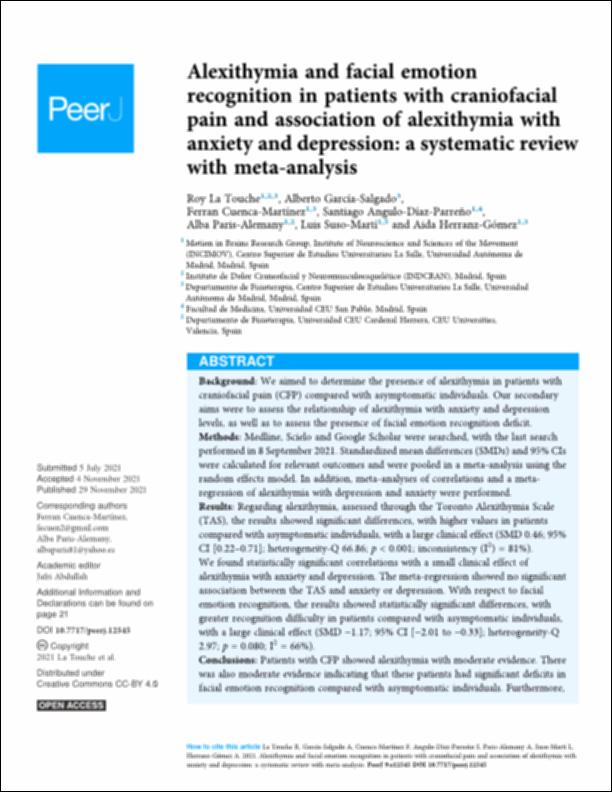Please use this identifier to cite or link to this item:
http://hdl.handle.net/10637/13707Alexithymia and facial emotion recognition in patients with craniofacial pain and association of alexithymia with anxiety and depression : a systematic review with meta-analysis
| Title: | Alexithymia and facial emotion recognition in patients with craniofacial pain and association of alexithymia with anxiety and depression : a systematic review with meta-analysis |
| Authors : | La Touche Arbizu, Roy García Salgado, Alberto Cuenca Martínez, Ferran Angulo Díaz-Parreño, Santiago París Alemany, Alba Suso Martí, Luis Herranz Gómez, Aída |
| Keywords: | Headache.; Ansiedad.; Enfermedades mentales.; Mental illness.; Alexitimia.; Alexithymia.; Anxiety.; Psychology, Pathological.; Cefalalgia.; Emociones - Trastornos.; Emotional disorders.; Depresión mental.; Depression, Mental.; Psicopatología. |
| Publisher: | PeerJ, Inc. |
| Citation: | La Touche, R., García-Salgado, A., Cuenca-Martínez, F., Angulo-Díaz-Parreño, S., Paris-Alemany, A., Suso-Martí, L. & Herranz-Gómez, A. (2021). Alexithymia and facial emotion recognition in patients with craniofacial pain and association of alexithymia with anxiety and depression: a systematic review with meta-analysis. PeerJ, vol. 9, art. e12545 (29 nov.). DOI: https://doi.org/10.7717/peerj.12545 |
| Abstract: | Background: We aimed to determine the presence of alexithymia in patients with craniofacial pain (CFP) compared with asymptomatic individuals. Our secondary aims were to assess the relationship of alexithymia with anxiety and depression levels, as well as to assess the presence of facial emotion recognition deficit. Methods: Medline, Scielo and Google Scholar were searched, with the last search performed in 8 September 2021. Standardized mean differences (SMDs) and 95% CIs were calculated for relevant outcomes and were pooled in a meta-analysis using the random effects model. In addition, meta-analyses of correlations and a metaregression of alexithymia with depression and anxiety were performed. Results: Regarding alexithymia, assessed through the Toronto Alexithymia Scale (TAS), the results showed significant differences, with higher values in patients compared with asymptomatic individuals, with a large clinical effect (SMD 0.46; 95% CI [0.22–0.71]; heterogeneity-Q 66.86; p < 0.001; inconsistency (I2) = 81%). We found statistically significant correlations with a small clinical effect of alexithymia with anxiety and depression. The meta-regression showed no significant association between the TAS and anxiety or depression. With respect to facial emotion recognition, the results showed statistically significant differences, with greater recognition difficulty in patients compared with asymptomatic individuals, with a large clinical effect (SMD −1.17; 95% CI [−2.01 to −0.33]; heterogeneity-Q 2.97; p = 0.080; I2 = 66%). Conclusions: Patients with CFP showed alexithymia with moderate evidence. There was also moderate evidence indicating that these patients had significant deficits in facial emotion recognition compared with asymptomatic individuals. Furthermore, alexithymia showed statistically significant correlations with anxiety and depression levels. |
| Description: | Este artículo se encuentra disponible en la siguiente URL: https://peerj.com/articles/12545/ |
| URI: | http://hdl.handle.net/10637/13707 |
| Rights : | http://creativecommons.org/licenses/by/4.0/deed.es |
| ISSN: | 2167-8359 (Electrónico) |
| Issue Date: | 29-Nov-2021 |
| Center : | Universidad Cardenal Herrera-CEU |
| Appears in Collections: | Dpto. Enfermería y Fisioterapia |
Items in DSpace are protected by copyright, with all rights reserved, unless otherwise indicated.


